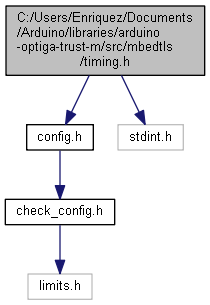Portable interface to timeouts and to the CPU cycle counter. More...

Go to the source code of this file.
Classes | |
| struct | mbedtls_timing_hr_time |
| timer structure More... | |
| struct | mbedtls_timing_delay_context |
| Context for mbedtls_timing_set/get_delay() More... | |
Typedefs | |
| typedef struct mbedtls_timing_delay_context | mbedtls_timing_delay_context |
| Context for mbedtls_timing_set/get_delay() More... | |
Functions | |
| unsigned long | mbedtls_timing_hardclock (void) |
| Return the CPU cycle counter value. More... | |
| unsigned long | mbedtls_timing_get_timer (struct mbedtls_timing_hr_time *val, int reset) |
| Return the elapsed time in milliseconds. More... | |
| void | mbedtls_set_alarm (int seconds) |
| Setup an alarm clock. More... | |
| void | mbedtls_timing_set_delay (void *data, uint32_t int_ms, uint32_t fin_ms) |
Set a pair of delays to watch (See mbedtls_timing_get_delay().) More... | |
| int | mbedtls_timing_get_delay (void *data) |
| Get the status of delays (Memory helper: number of delays passed.) More... | |
Variables | |
| volatile int | mbedtls_timing_alarmed |
Portable interface to timeouts and to the CPU cycle counter.
| typedef struct mbedtls_timing_delay_context mbedtls_timing_delay_context |
Context for mbedtls_timing_set/get_delay()
| void mbedtls_set_alarm | ( | int | seconds | ) |
Setup an alarm clock.
| seconds | delay before the "mbedtls_timing_alarmed" flag is set (must be >=0) |
| int mbedtls_timing_get_delay | ( | void * | data | ) |
Get the status of delays (Memory helper: number of delays passed.)
| data | Pointer to timing data Must point to a valid mbedtls_timing_delay_context struct. |
| unsigned long mbedtls_timing_get_timer | ( | struct mbedtls_timing_hr_time * | val, |
| int | reset | ||
| ) |
Return the elapsed time in milliseconds.
| val | points to a timer structure |
| reset | If 0, query the elapsed time. Otherwise (re)start the timer. |
Determining the elapsed time and resetting the timer is not
atomic on all platforms, so after the sequence
`{ get_timer(1); ...; time1 = get_timer(1); ...; time2 =
get_timer(0) }` the value time1+time2 is only approximately
the delay since the first reset.
| unsigned long mbedtls_timing_hardclock | ( | void | ) |
Return the CPU cycle counter value.
| void mbedtls_timing_set_delay | ( | void * | data, |
| uint32_t | int_ms, | ||
| uint32_t | fin_ms | ||
| ) |
Set a pair of delays to watch (See mbedtls_timing_get_delay().)
| data | Pointer to timing data. Must point to a valid mbedtls_timing_delay_context struct. |
| int_ms | First (intermediate) delay in milliseconds. The effect if int_ms > fin_ms is unspecified. |
| fin_ms | Second (final) delay in milliseconds. Pass 0 to cancel the current delay. |
mbedtls_timing_set_timer directly or use this function with int_ms == fin_ms. | volatile int mbedtls_timing_alarmed |